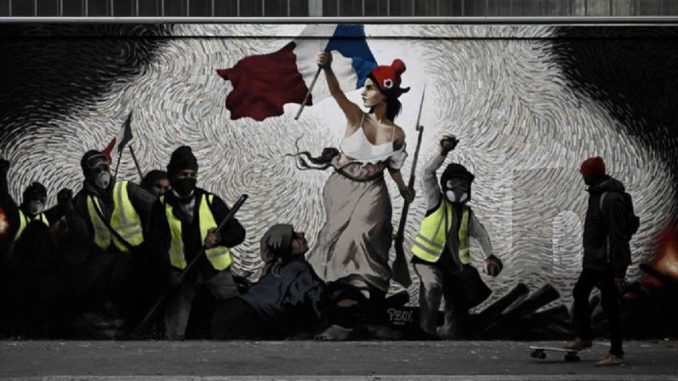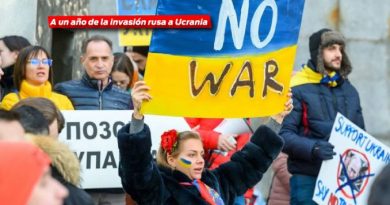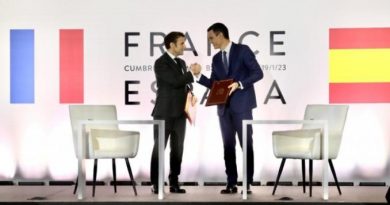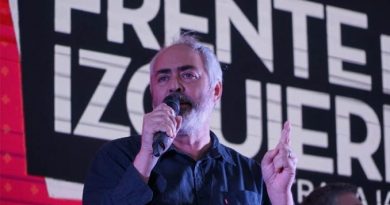France: where does the CCR go?
ByPablo Vasco
Of the 16 al 18 from December, one week after the national congress of the New Anticapitalist Party, one of the main parties of the French extreme left, The congress of the Revolutionary Communist Current will also be held, a splinter organization from the NPA a year and a half ago. We present our critical opinion on the CCR pre-congress documents, in the context of the political challenges that open up for the French revolutionary left and the need for a new regroupment.
At CCR, best known for her Permanent Revolution website, is the national section of the Trotskyist Fraction for the Fourth International (FT-CI) who leads the Argentine PTS. By the way, although it is calledfraction to onepart distinct but part of aall superior, It is striking that it calls itself a current circumscribed to itself.
The CCR broke with the NPA in June 2021 after launching his own presidential candidate[1], which gave the leadership of said party a pretext to separate them and thus weaken the left wing. One year later, at a national conference, 104 delegates elected by 300 militants called to build“a new revolutionary organization, at the height of the urgency of ending the capitalist system and laying the foundations of a communist society”[2]. Its founding congress will be 16 al 18 from December. In these last two weeks, in pre-congress assemblies, report that they participated 400 people between militants and observers[3].
Separate figures, the first political problem is that if the CCR, Instead of leaving the NPA prematurely, he would have stayed to battle alongside the other three currents of the left against the mistaken follow-onism of the Mandelist leadership towards La Francia Insumisa (LFI), as they are doing La Chispa, Anticapitalism and Revolution and Revolutionary Democracy, the relationship of forces within the NPA today would be clearly favorable to the revolutionary sectors.
This is not a minor political option as the NPA, junto a Workers' Struggle, still in decline both, are the two historical forces of the French extreme left, who was always a reference for all world Trotskyism. And an NPA is not the same as an institutional "left of the left" wing, o sea of the LFI-NUPES of Mélenchon, that an NPA independent of that parliamentary reformism, inserted in the class struggle and with a revolutionary leadership and strategy. Especially if you really want, as the CCR says, build an organization"at the height of ending the capitalist system and laying the foundations of a communist society" in an imperialist country like France. As well, We are of the opinion that if that perspective receded, it is largely due to the political responsibility of the CCR, that in a hasty way, sectarian and self-proclaimed, he prioritized building his group separately instead of building it as part of a unitary and qualitatively superior revolutionary alternative.
What is the reality of the NPA today, whose most probable perspective is a breakout pushed by the management? Contrary to what lightly predicted in 2021 the CCR-PTS when split, about what"The leftist groups of the NPA will end up in the most bitter impotence"[4], they grew and gained new militants, as did for example La Chispa, who in addition to his union presence today leads the youth of the NPA. At the NPA pre-congress assemblies, what is done now, of the 9 al 11 of November, about some 1.500 militants who voted, the platform of the Mandelist ruling party achieved a 48,3% of votes, the unitary platform on the left a 45,6% and the third centrist platform a 6%. We insist: if the CCR had stayed, the left as a whole clearly won this congress and therefore the political leadership of the NPA.
Political problems
For its congress, the CCR presents three texts -international, France and party-, on which we take a critical look here.
According to its international document[5], Russia“it is not an imperialist power”. It is a characterization that we consider wrong., from which they deduce an also mistaken policy towards the war in Ukraine. in other texts, the FT-CI does not define Russia even as a sub-imperialist country, but of“attenuated dependency”, a“fundamentally subaltern condition”[6], that is to say, they believe it rather similar to the vast majority of countries in Africa, Asia and Latin America... although with a little more weapons.
In his workThe imperialism, upper stage of capitalism, Lenin made a factual description of these powers that emerged, but without fixing such characteristics as an inexorable condition. Y de las tres categorías de países que allí señala, imperialist, dependent eintermedios, la actual Rusia de Putin, visto su poderío y su rol económico, militar y geopolítico como un todo[7], que siempre es más que la suma de las partes, lejos de ser un país dependiente o subalterno es una potencia imperialista, opresora de pueblos en el Este europeo.
Because, siguiendo el ejemplo de Trotsky ante la guerra China-Japón en 1937 y otros similares, hoy una postura revolucionaria debe combinar el repudio a la invasión rusa, la denuncia de la OTAN y el apoyo a la resistencia armada ucraniana, con total independencia política del gobierno de Zelensky. En cambio la CCR repite el grave error de toda la FT-CI de negar por completo el componente de guerra justa de liberación o autodefensa de Ucrania frente a la invasión y, al igual que todo el campismo, en una postura funcional a Putin afirma que la victoria de Ucrania“fortalecería al imperialismo” occidental. Un análisis completamente antimarxista, que desconoce que en primer lugar una derrota de Putin tonificaría y alentaría a salir a pelear por sus derechos no sólo al pueblo trabajador ucraniano, sino a sus hermanos de clase rusos y a los de todas las repúblicas y nacionalidades de la región para las cuales el imperio opresor concreto y directo es Rusia.
Además el texto de la CCR, que detalla con minucia las variables superestructurales y militares de ese conflicto, y que exagera un alejamiento de Alemania respecto de la Unión Europea para erigir un nuevo eje imperialista, habla poco sobre la lucha de clases en el mundo, nada sobre la vanguardia obrera y juvenil, las luchas feministas y ecologistas, la izquierda revolucionaria y apenas dedica un ínfimo 0,6% de su extenso espacio al proceso revolucionario en Irán, al que minimiza como una simple “ola de revueltas”.
Tampoco hay una caracterización marxista de si la situación mundial es revolucionaria, pre-revolutionary, no revolucionaria o contrarrevolucionaria.“Una era caótica”, dicen vagamente, with“cambios estructurales”, what“pueden conducir a puntos de inflexión en la lucha de clases”. Y tras reconocer que entran en lucha“sectores cada vez más importantes de la clase obrera”, en unas pocas líneas enumeran la importancia de la pelea salarial, from“una política audaz para quebrar el peso conservador de la burocracia sindical” and that“urge abordar la construcción de partidos revolucionarios con una clara orientación estratégica y programática”. A) Yes, generalidades. Parece que la CCR, como se dice en Francia, “descubrió el agua caliente”…
El texto nacional señala un agravamiento de la crisis económica y política francesa, dos proyectos bonapartistas (Macron y Le Pen), una nueva mediación neorreformista (NUPES), el seguidismo del NPA y un avance de las luchas. Su programa destaca las consignas deescala móvil de salarios, huelga indeterminada, fight planand aprograma democrático radical contra el régimen autoritario, pero carece de toda consigna de poder para propagandizar, como por ejemplo un gobierno de las y los trabajadores. Otra omisión notoria es que tampoco aparecen consignas por la disolución de la OTAN, ni contra la Unión Europea y sus instituciones ni la estrategia alternativa de una federación europea de repúblicas socialistas, una Europa de los trabajadores y los pueblos u otra similar.
Si bien su texto sobre partido incluye una frase general, “estar siempre junto a los pueblos oprimidos por las potencias imperalistas y muy particularmente cuando se trata del imperialismo francés”, omiten exigencias antiimperialistas elementales como la independencia definitiva de los territorios de ultramar, la ruptura de los pactos que atan a las ex colonias francesas y el retiro de todas las tropas y bases militares francesas en el extranjero (14 countries[8]).
Likewise, en dicho documento la CCR se propone“contribuir a la construcción de un partido obrero revolucionario capaz de transformar las revueltas en revolución”. Pero luego sólo valoran sus propias recetas y acusan a las corrientes de izquierda del NPA de“temor” y de que“apostaban a formas de conciliación con la dirección”. Según dicen, “de acuerdo al resultado del congreso del NPA y las conclusiones que saquen se podría replantear este debate”…
Si la CCR persiste en mirarse el ombligo con autosuficiencia, será una nueva secta trotskista de las que ya abundan en Francia y muchos otros países. Si de verdad quieren“transformar las revueltas en revolución” no deben condicionar un planteo frentista hacia las otras corrientes revolucionarias, y proponerse ya sea avanzar hacia un partido revolucionario en común con libertad de tendencias, un frente al estilo del FIT Unidad argentino u otras variantes. No hacerlo es criminal. La disyuntiva está planteada.
[1] Al final no se pudo presentar, ya que la CCR sólo alcanzó la mitad de las firmas legales requeridas.
[2] https://www.revolutionpermanente.fr/Appel-Pour-la-creation-d-une-nouvelle-organisation-revolutionnaire
[3] https://www.revolutionpermanente.fr/Nouvelle-organisation-revolutionnaire-400-personnes-dans-les-AGs-pre-Congres-dans-toute-la-France
[4] https://www.laizquierdadiario.com/Francia-crisis-terminal-del-NPA-y-emergencia-de-una-nueva-corriente-revolucionaria
[5] https://www.revolutionpermanente.fr/La-guerre-en-Ukraine-et-l-acceleration-des-tendances-aux-crises-guerres-et-revolutions
[6] https://www.laizquierdadiario.com/Semiperiferias-Subimperialismos-Debates-sobre-el-imperialismo-hoy
[7] País más extenso del mundo, primera potencia energética , primera potencia mineral, segunda potencia militar (con bases y tropas en otros 15 countries), segunda potencia nuclear, undécima economía del mundo e influencia regional y global. Es uno de los cinco únicos países con poder de veto en el Consejo de Seguridad de la ONU.
[8] Lebanon, United Arab Emirates, Ivory Coast, Yibuti, Gabón, Senegal, Chad, Niger, Antillas, Guyana, Polinesia, Reunión, Nueva Caledonia e Índico Sur.




